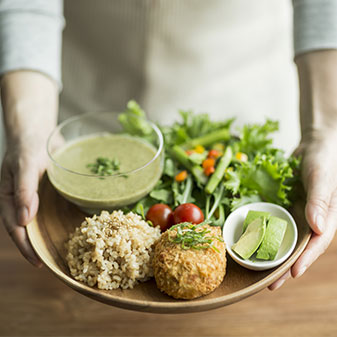Why Organic?
Four important reasons to switch to organic
According to the AustOrganic 2019 market report, more than 60 per cent of Australian households now buy organic

products in any given year, and for good reason. How your food is grown, prepared, or raised can have a huge impact, both for your health and for the environment. If you’re still not sure whether to make the switch, read on to find out why organic food really is the healthier option.
1. Organic produce has a higher nutrient value.
Fruits, vegetables, nuts, and grains that have been produced organically will often be more nutrient-dense than non-organic commercial crops. A 2014 study at Newcastle University found that quantities of cancer-fighting antioxidants are 19 to 69 per cent higher in organic fruit and veg, while organic dairy has been found to contain up to 50 per cent more omega-3 fats.
One reason for this is that conventional crops are often heavily fertilised. That means while they may grow faster and bigger than organic produce, their nutrients are also likely to get diluted in the process.
2. Organic foods are chemical-free.
Another huge benefit of eating organic is that you reduce your risk of consuming nasty pesticides, herbicides, and fungicides. Bug-killing chemical fertilisers can harm more than just the pests they target — high exposure in humans has been linked to some cancers and neuro-developmental diseases.
Even nuts and grains are grown using anti-pest or fungus treatments, and can be heavily sprayed with chemicals. Cashews, pistachios, and peanuts in particular are likely to have a higher pesticide load. And with some grains — particularly rice, since it is often in standing water — there is a risk that these chemicals are carried to the dinner plate.
3. Organic produce is often fresher and tastier.
Organic produce isn’t treated with waxes or chemical preservatives, which means it has to be sent from the farm to the shelves quickly. Organic food is often produced on smaller farms that are local to where it’s sold too, which means your fruit and veg are less likely to lose freshness during transportation. And here’s another bonus to shopping organic — fresher food often translates into tastier food, too.
4. Organic farming practices are better for the environment.
Lastly, there’s an environmental incentive to shop organic. Organic farming practices generally use less energy, increase natural soil fertility, aid water conservation, and reduce soil erosion. Because they don’t use chemical fertilisers, they release less nitrogen into the water, soil, and into the atmosphere too. Organic farming is better for the animals as well, because it typically involves free-range and pasture-led rearing.
Organic Pantry is NASAA Certification Organic, which means we meet all domestic and international export market requirements and our products uphold the highest standards of food integrity.
Make the switch and shop online with us today to see the difference organic can make.
References
AustOrganic 2019 Market Report
